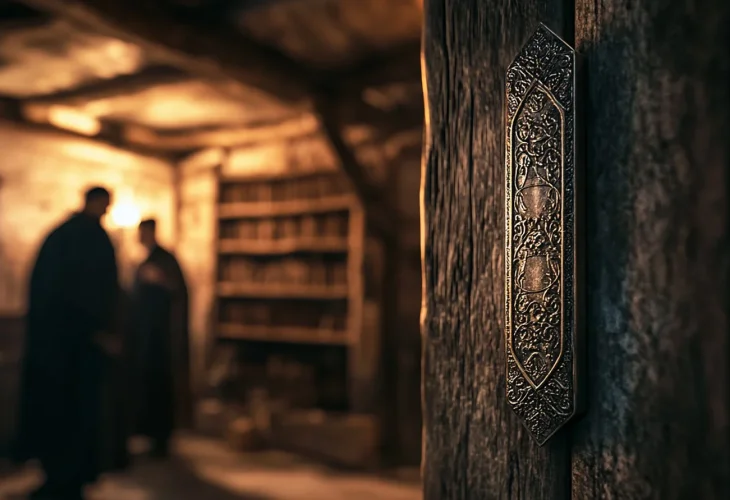History and Archaeology
The Mezuzah Dilemma: A Jewish Merchant Faces a Test
When a powerful bishop demands a mezuzah, Rabbi Zalman turns to the Maharil for clarity

Zalman from Salzburg felt overwhelmed by his predicament. Just moments earlier, he had thought his life was finally turning around. Now, everything seemed uncertain, hanging by a thread.
Only yesterday, Zalman had gone to the bishop of Salzburg’s grand new castle to finalize a deal selling horses for the bishop’s new stable. The bishop received him with such exaggerated politeness that it raised Zalman’s suspicions. But after the deal was done, the bishop leaned in with a strange request.
“Zalman,” he said, “I trust only you with my horses, and I know you barely make a living. You have seven children and may your G-d bless them. I want to offer you something better. I understand that you Jews place a sacred charm on your doorways—a ‘mezuzah,’ you call it, which protects you from harm. I’ve heard stories. Another bishop placed one at his entrance, and no enemy could enter. I believe in it. I want one for the gate of my new castle. Don’t worry it will be hidden. But I need that protection. The baron of Lichtenstein is making threats. If you bring me this mezuzah, you’ll never want for anything again. But if you try to outsmart me as Jews tend to do then your life will become much harder.”
Zalman left the castle excited, already imagining which mezuzah he would choose, dreaming of a better future. But when he arrived home and shared the story, his wife paused and asked a simple question: “Is it even allowed to sell a mezuzah to a non-Jew?”
Zalman was stunned. “Why wouldn’t it be?” he asked. “Isn’t it just like not performing a brit milah (circumcision) for a non-Jew? Or not letting them keep Shabbat? I don’t know... We should ask a great Torah scholar. But we don’t have one nearby.”
Feeling his hopes slip away, Zalman quickly found a messenger heading to the Jewish community in Mainz, near the Rhine River, and sent a letter to his uncle, the great Rabbi Yaakov Molin, known as the Maharil, the leading halachic authority of Ashkenazi Jewry.
The Maharil wrote a detailed response, but since the messenger was in a hurry, he passed along only the essential ruling: forbidden.
In his responsa (section 123), the Maharil wrote:
“My wise relative, Rabbi Zalman of Salzburg, asked me for a ruling regarding a mezuzah requested by the bishop, who promised him lifelong reward. Zalman feared that refusal would bring great harm. I presented several reasons why it is forbidden to give a mezuzah to a non-Jew. Regrettably, the messenger was in a rush and couldn’t leave a full copy of the response.”
Among the Maharil’s reasons: there is concern the mezuzah will be disrespected. It is a sacred object. Our sages even required us to buy back holy books, tefillin, and mezuzahs that ended up in non-Jewish hands just to prevent them from being mistreated.
Even if the non-Jew wants the mezuzah for protection, what will happen after he dies? Will his children respect it?
Another issue: a non-Jew with a mezuzah at his door may give others the impression that he is Jewish. Jews might trust him, even eat in his home something that could lead to confusion or worse.
But what about danger? The bishop had clearly threatened Zalman. Could he not give it to save himself?
The Maharil answered: “We can avoid the non-Jew. To us, the mezuzah is holy, full of meaning. But to them, it’s meaningless. To us, it reminds us of Hashem’s unity and the yoke of Heaven and it protects because of what it represents. But to them, it becomes a symbol of sin, as they live contrary to its message.”
As for the story of the fortress that was supposedly saved by a mezuzah? “Coincidence,” the Maharil said.
The Maharil taught an important lesson drawn from generations of Jewish experience: while it might seem easier and even safer to give in to such a request, doing so often leads to greater harm. When a Jew stays strong and true to his values, the non-Jew sees him as genuine and trustworthy. But if he compromises his faith, he loses respect and standing.
And so ruled the Maharil, as our tradition has taught us again and again.
Even today, this issue comes up. For example, someone might have a mezuzah on the door of a home they rent out. But if the tenant is not Jewish, halachic authorities say to remove the mezuzah. Why? Because a non-Jew living behind a mezuzah might be mistaken for a Jew. Someone might think, “Oh, he must be Jewish,” and begin to form relationships or trust based on that.
For that reason, the guidance remains: remove the mezuzah while the non-Jew lives there. Keep the sacred object in sacred hands.
Ach Tov VaChesed – Daily Halacha

